CIVIL RIGHTS HISTORY
In the late 1950s, the Washington D.C. area was a focal point of racial tension and civil rights activism. The city, like much of the United States, was grappling with the legacy and reality of segregation. African Americans in the capital were fighting for desegregation in schools, public facilities, employment, and housing. It was a time of hope and frustration, as progress was slow and met with resistance.
- The Summer of Change
-
In Glen Echo Park history, the summer of 1960 is often referred to as the “Summer of Change,” because it was then that a group of Howard University students organized themselves as the Nonviolent Action Group (NAG) to combat racism and segregation in the D.C. area and chose the now-defunct Glen Echo Amusement Park as one of their first protests.
With tickets purchased by a White NAG member, the students seated themselves on the carousel animals. Seeing that there were Black students in the group, the carousel operator refused to start the ride. This launched a standoff; two and a half hours later, five Black students were arrested for trespassing.
White community members from the nearby Bannockburn neighborhood were already challenging the amusement park’s segregation rule, so when NAG activists returned the following day, their numbers were quickly boosted by local residents. Union members from the national labor movement also joined the cause. The picket line continued every day that summer, with numbers ranging from 25 to hundreds. Protesters endured 90 degree heat, threats of violence, and a counter-protest organized by George Lincoln Rockwell’s American Nazi Party.
Throughout the summer, local press wrote articles that helped publicize the protests and attract more supporters. By August, celebrities and national figures began to speak out. What began with a few young members of NAG, now was a powerful movement that echoed protests in North Carolina, Atlanta, and New Orleans.
The Glen Echo Amusement Park protests ended on September 11, when the park closed for the season. Over that winter, U.S. Attorney General Robert Kennedy intervened, and by March 14, 1961, the private owners of the Glen Echo Amusement Park had abandoned their segregation practices. When the park opened again for a new season in the summer of 1961, it was open to all, and it remained so until the permanent closing of the amusement park and its rides in 1968.
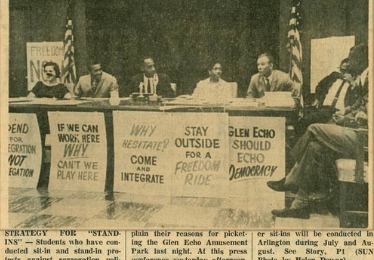
Hearing on the Glen Echo Amusement Park civil rights protests.
National Park Service, Glen Echo Park Photo Archives
- Glen Echo Park Civil Rights Story Brochure
-
For best viewing, click the full screen icon (
) in the bottom right corner of the catalog screen (or in the middle of the screen if you are on a mobile device).
- Protestas en el Glen Echo Amusement Park de 1960
-
Para una mejor visualización, haga clic en el icono de pantalla completa (
) en la esquina inferior derecha de la pantalla del catálogo (o en el centro de la pantalla si está en un dispositivo móvil).
Glen Echo Park Civil Rights and History Tour with National Park Service
Monthly on the first Saturday of the month. 10:00am - 10:45am. Meeting at the Dentzel Carousel.
Who led the Civil Rights protests to desegregate Glen Echo Amusement Park in 1960? Which amusement park ride was a focal point of the protests? How did Glen Echo Park become part of the National Park System? Explore Glen Echo Park’s history on this 45-minute free walking tour and find out the answers to these questions and more! This 45-minute ranger-led tour starts at the Dentzel Carousel at 10:00am. No registration required.
- The Fun Wasn't For Everyone
-
"Fun is where you find it. Where do you find it? Glen Echo Amusement Park!" —Radio advertising jingle
From its beginnings as a Chautauqua in 1891 and later as a place of amusement in the 1890s, Glen Echo Park only advertised in newspapers with primarily White readerships, such as the Washington Post and Evening Star. The park was not strictly segregated, but visitation by Black individuals and families was not encouraged, and likely discouraged. Excursion groups, however, were lucrative and park management actively booked church Sunday schools from both Black and White communities, often on the same day. This continued into the mid- 1920s. Restrictions hardened in 1931 with the opening of the Crystal Pool. From that point through the 1950s, park security did not admit Black patrons. This policy was widely understood, but never signposted.
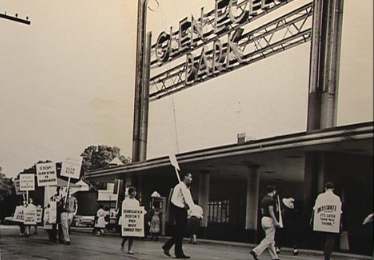
Picketers protest the segregation policies of the privately-owned Glen Echo Amusement Park in the summer of 1960.
National Park Service, Glen Echo Park Photo Archives
The text above is an excerpt from Glen Echo Park Carousel: A Brief History of the First 100 Years of the W.H. Dentzel Carousel at Glen Echo Park by Barbara Fahs Charles. (Read the entire history here.)
- 1960. Carousel Sit-in and Picketing for Civil Rights
-
Collins: Are you white or colored?
Henry: Am I white or colored?
Collins: That’s correct. That’s what I want to know. Can I ask your race?
Henry: My race? I belong to the human race.
Collins: All right. This park is segregated.
Henry: I don’t understand what you mean.
Collins: It’s strictly for white people.
Henry: It’s strictly for white persons?
Collins: Uh-hum. It has been for years.
—Confrontation between deputized security guard Francis J. Collins and Laurence Henry, spokesman for protesters
The sit-in by Black college students at a lunch counter in Greensboro, North Carolina, in early 1960 inspired similar protests around the country. In Washington, Howard University students, led by Laurence Henry, organized as the Nonviolent Action Group (NAG) and successfully integrated lunch counters in Arlington, Virginia. Glen Echo Amusement Park, strictly segregated for decades, was their next target. On June 30, 1960, a sit-in was staged at the park restaurant. When that was closed off, 13 protesters, both Black and White, headed to the carousel with pre-purchased tickets in hand. They mounted their animals, but the operator refused to start the ride. After a two-and-a- half-hour stand-off, five Black protesters were arrested for trespassing. The NAG activists returned the following day and picketed for weeks together with White supporters, especially residents of Bannockburn, a liberal enclave adjacent to Glen Echo Park, and union members from the AFL-CIO. On several occasions, they faced counter-protests from George Lincoln Rockwell’s American Nazi Party. Despite such harassment, the well- organized picket line, with daily shifts from 3pm until the park closed at night, continued until September 11, the end of the 1960 season.
The protesters vowed to return the following year, but just before the 1961 season was to start, the owners announced that the park would now be open to all. Glen Echo Amusement Park was desegregated, but the legal battle over the carousel sit-in continued. The Supreme Court ruled in June 1964 that the arrests violated the Fourteenth Amendment. Two months later, Congress passed the Civil Rights Act of 1964 banning discrimination in places of public accommodation. Glen Echo Amusement Park welcomed everyone for eight years, but did not reopen for the 1969 season.
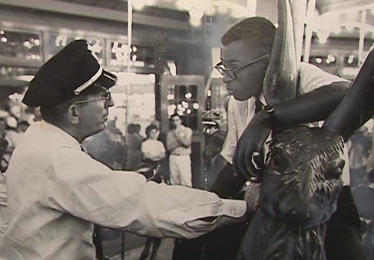
Francis J. Collins, deputized park security guard, and Marvous Saunders, protestor, at the carousel sit-in, June 30, 1960.
National Park Service, Glen Echo Park Photo Archives
The text above is an excerpt from Glen Echo Park Carousel: A Brief History of the First 100 Years of the W.H. Dentzel Carousel at Glen Echo Park by Barbara Fahs Charles. (Read the entire history here.)
- Honoring the Legacy
-
2025 | To honor the 65th anniversary of the 1960 protests, the Partnership presented three free screenings of Ain’t No Back to a Merry-Go-Round as part of Montgomery County Heritage Days. This was the first time the film was screened at Glen Echo Park. The day also included an NPS Ranger-led history tour, an exhibition of civil rights protest photos, and free rides on the Park's historic 1921 Dentzel carousel.
2025 | In 2025, the National Park Service developed a Glen Echo Park Civil Rights & History Tour that is presented on the first Saturday of each month.
2024 | The Glen Echo Park Partnership for Arts and Culture, AFI Silver Theatre, Montgomery History, and the Montgomery County Commission on Remembrance & Reconciliation presented the Montgomery County premiere of Ain't No Back to a Merry-Go-Round by Emmy Award-winning director Ilana Trachtman. The film tells the riveting story of the Glen Echo Park 1960 civil rights protests that led to the desegregation of the Park and played a significant role in the wider Washington, DC area civil rights movement.
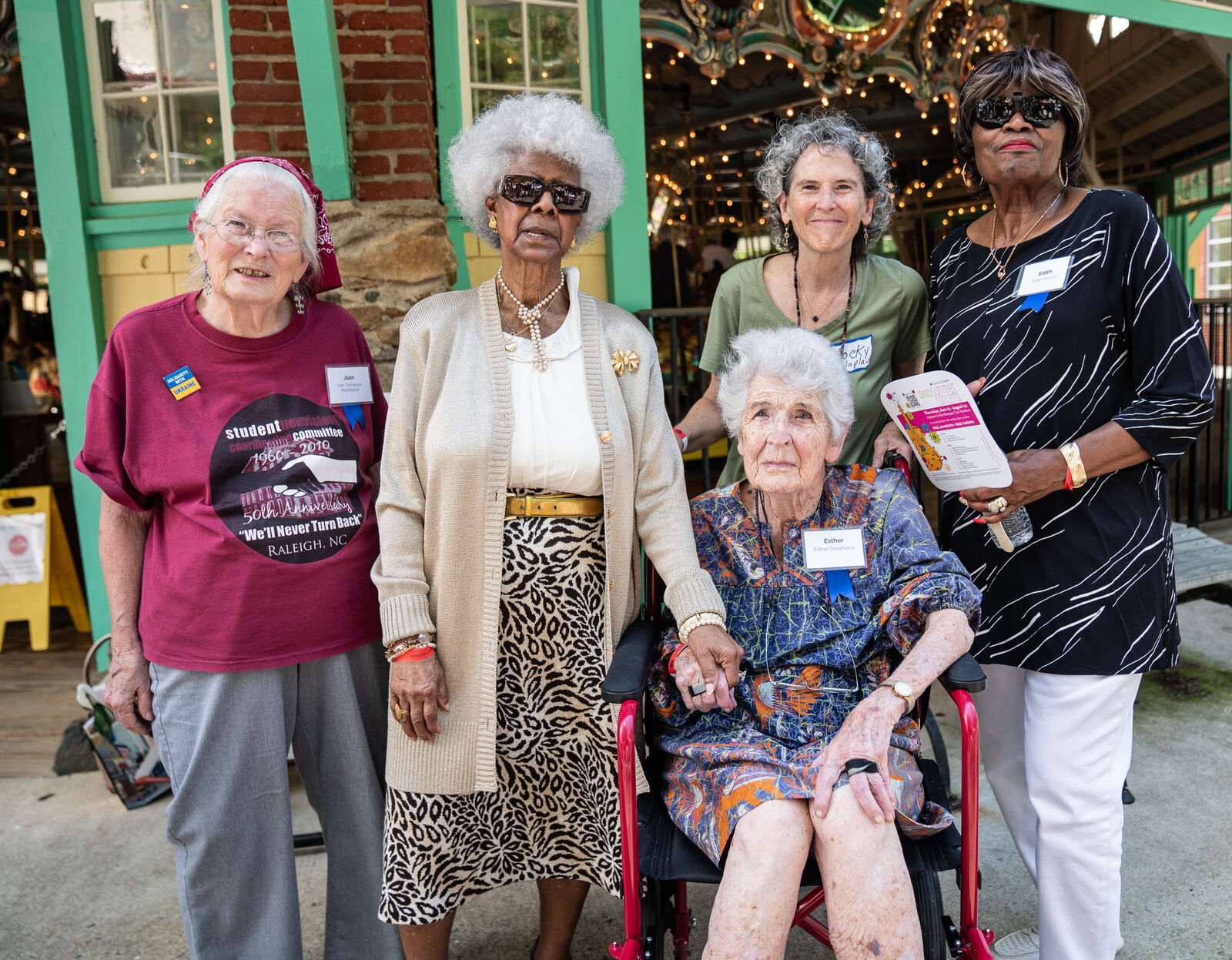
2023 | On June 25, 2023, sixty-three years after the 1960 Summer of Protest, the Glen Echo Park Partnership for Arts and Culture was honored to present the Festival of Freedom with Washington Revels. The event was a powerful success as the Partnership proudly welcomed to the Park four original protesters from the 1960 carousel protests—from left to right below, Joan Trompauer Mulholland, Tina Clarke, Esther Delaplaine, her daughter Rocky Delaplaine, and Edith Shorts—which led to the end of segregation at the Glen Echo Amusement Park.
2022 | At our annual Gala in the Park, a proclamation honoring the 1960 protesters was read by Montgomery County Executive Marc Elrich. Read the proclamation here.
2010 | 50th Anniversary event commemorating the “Summer of Change” protests
2008 | Installation of a Plaque dedicated to the protesters in front of the carousel
2005 | “Summer of Change” Protesters Reunion (45th Anniversary
Glen Echo Park Civil Rights History Film
Ain't No Back to a Merry-Go-Round, a documentary by Emmy-award winning director Ilana Trachtman, tells the important story of the 1960 protests that resulted in the integration of the privately-owned Glen Echo Amusement Park in 1961. With never-before seen footage, and immersive storytelling, four living protesters rescue this untold story, revealing the price, and the power, of heeding the impulse to activism.
Learn about the Civil Rights history of the Glen Echo Park carousel with Ilana Trachtman's 2021 talk that was part of a lecture series for the Carousel 100th Anniversary Celebration.
- Watch the talk
Press
- "Ain’t No Back to a Merry-Go-Round"
-
WAMU "New film ‘Ain’t No Back to a Merry-Go-Round’ spotlights those who fought to integrate Glen Echo Amusement Park" (5/23/25)
WUSA9 "Producer of Glen Echo Civil Rights documentary talks about summer-long protest many haven't heard of" (5/16/25)
Review of Ain’t No Back to a Merry-Go-Round in The Washington Post “‘Ain’t No Back to a Merry-Go-Round’ revisits a key civil rights protest” by Ann Hornaday (5/2/25)
The Washington Post “Documentary recalls 1960 protest to integrate Glen Echo Amusement Park” by Hau Chu (4/25/25)
- Civil Rights History
-
DCist "Civil Rights Protesters Recount The Little-Told Story Of The Fight To Desegregate Glen Echo" by Matt Blitz (6/29/18)
Washingtonian "Quite a Ride" by Drew Bratcher (5/01/08)
Back to Carousel History >> | Back to Park History >>
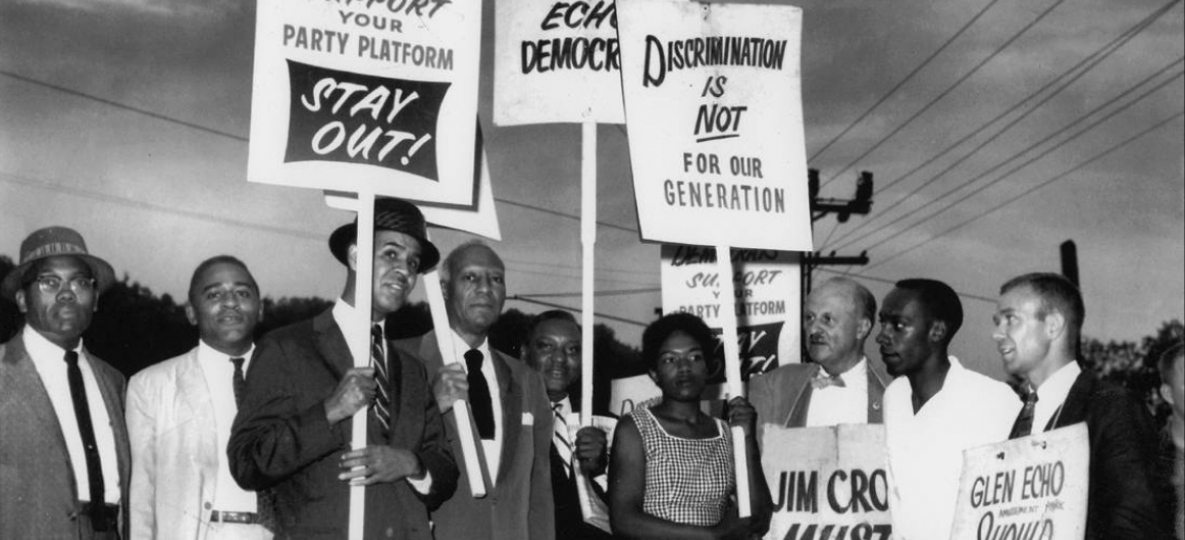
 Facebook
Facebook YouTube
YouTube Instagram
Instagram LinkedIn
LinkedIn